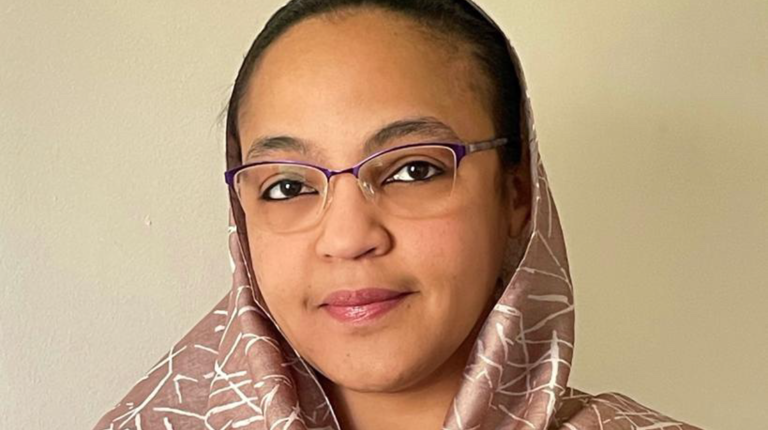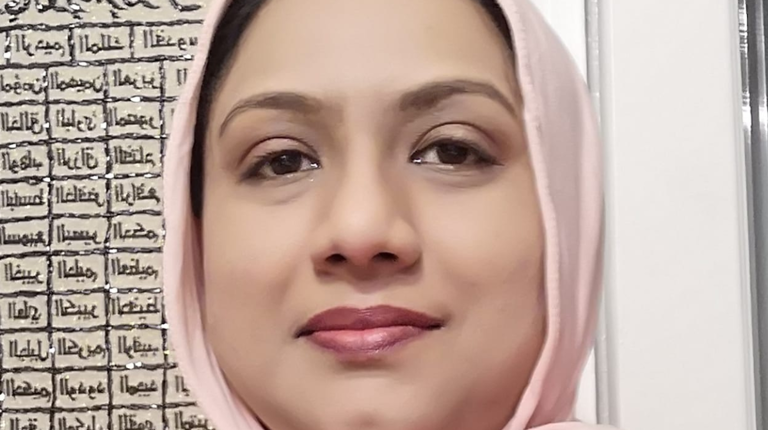Dr Sarah El Khatim
With experience working in a variety of roles within O&G including two years in the specialty training programme, as a locally employed doctor and now as a SAS doctor, Dr Sarah El Khatim has a vast amount of knowledge about the O&G workforce.
Putting this knowledge into good use, Sarah has also been actively involved with networks to address poor workplace behaviour.

"Tackling racism and improving workplace culture, for me, is extremely important."
Dr Sarah El Khatim discovered her passion for O&G during her first labour ward placement when she realised the huge impact doctors in the specialty have on the wellbeing of women.
After eight years of practice, she made the difficult decision to move to the UK while her family remained in Sudan, she completed her International English Language Testing Systems (IELTS) and Professional and Linguistic Assessments Board (PLAB) exams and registered with the GMC.
Sarah then secured two years of Foundation training at Queen's Medical Centre in Nottingham. Soon after, she applied for the O&G specialty training programme and was placed in a fixed term ST1 post at United Lincolnshire Hospitals NHS Trust (ULHT). After bringing her daughter to the UK, Sarah decided to accept a locally employed doctor (LED) post, so that she could focus on providing stability for her family.
Sarah does not feel that moving to an LED post restricted her growth in the specialty or the opportunities available outside of clinical work. She has been active in her trust’s staff networks, including the Women’s Network and REACH Network (formally BAME), and has worked closely with the equality, diversity and inclusion (EDI) chairperson.
As well as taking on local roles, Sarah has also engaged with important College work. After attending a talk delivered by Ranee Thakar, RCOG President, Sarah expressed her interest in participating in the RCOG Race Equality Taskforce (RET) and has since contributed to toolkits and papers.
"The last two years have been a whirlwind for me. I never dreamed of working alongside such influential figures in the specialty, but at no point did they make me feel like I shouldn’t be there. They were very welcoming and respected my input."
With her consistent championing of SAS and LE doctors, Sarah then secured the role of regional representative for the East Midlands on the RCOG SAS and LED Committee.
Sarah doubts she could have accomplished all these achievements without the support she received when she first joined the NHS. Sarah cited the late Mr Lawrence Osuji, who was a SAS doctor, as a particularly influential source of guidance and encouragement.
"[Mr Osuji] didn't just teach me clinical skills. He taught me about how to behave as a doctor - about empathy, politeness and compassion. He was the epitome of a true educator and what it means to be a kind, generous human being. To me, he highlights the importance of SAS doctors as educators. I was constantly learning from him and I've passed these gifts on to the people I have trained."
Nonetheless, Sarah feels that more can be done to help International Medical Graduates (IMGs) and others joining the NHS. Colleagues should recognise that IMGs have unique knowledge to share from outside the UK. Indeed, all doctors should receive respect from their colleagues, regardless of career stage or job title.
"SAS and LE doctors make up a large portion of the workforce. We should treat all doctors the same - specialty trainee or LED - there shouldn't be any preferential treatment. Everyone deserves respect and fair opportunities to progress."
Sarah is keen to highlight the achievements of SAS doctors and the opportunities available to them.
"Be proud of the SAS role. I have my own clinic. I'm a Pan Trust Audit Lead. I have flexibility. I have autonomy. SAS can accomplish a lot, including leadership and educational roles."
After taking on more responsibility herself, Sarah decided to try and secure a SAS post. Although the COVID-19 pandemic caused delays, she was finally able to begin working on a SAS contract earlier this year. The new contract has provided more freedom than the previous LED role.
"The national terms and conditions were the main attraction. On a SAS contract you can have activities job planned and that has given me more time to focus on areas other than clinical work."
For LE doctors interested in taking up a SAS post, Sarah recommends that they identify their career goals and think about how these fit around their personal and family lives. They should also identify the resources available in their units, nationally and through the RCOG, then take full advantage of these. Networking can help LE doctors understand where to locate resources and develop a support system.
Please see below the resources to support newly appointed SAS doctors:
Building a community of SAS and LE doctors is just one of Sarah's goals during her term as a representative on the SAS and LED Committee.
"At the moment, SAS doctors have been working in silos. If we have a group that is interconnected, we can learn from each other and prosper."
Her main aim, however, is to encourage SAS and LE doctors to believe in themselves.
"Many glass ceilings have been shattered; the sky's your limit. The NHS have acknowledged the importance of SAS and LE doctors. We just need to grab this chance and run with it. There’s nothing to stop us. Nothing at all. Be determined, believe in yourself, and seek allies."

"I have learned a lot by being in this Committee … becoming a SAS and LED Committee member was a good turning point."


RCOG Membership
We work to support obstetricians and gynaecologists at a local, national, and international level in our mission to improve the health of women and girls. Find out how you can become part of our membership and the benefits that come with it.

